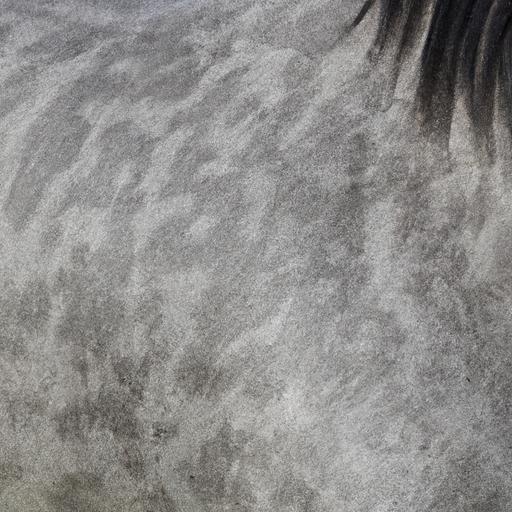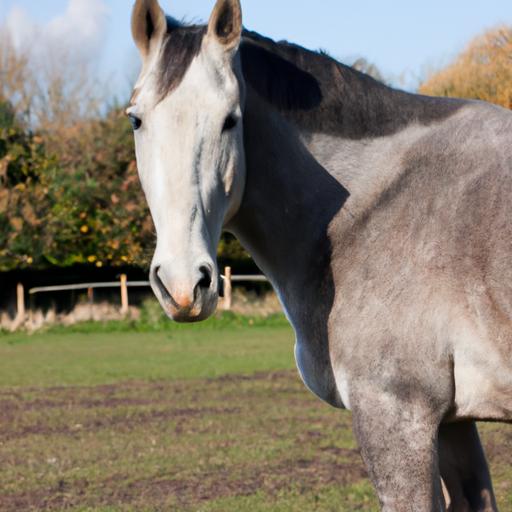Discover the essential preventive care measures for grey horses. Learn about regular check-ups, vaccinations, dental care, and parasite control to address grey horse health problems.
Grey horses have always been admired for their striking appearance and unique coat color progression. However, beneath their stunning exterior lies a set of health challenges that every grey horse owner should be aware of. In this article, we will delve into the world of grey horse health problems, discussing the significance of understanding and addressing these issues.
As an equine owner, it is crucial to prioritize your horse’s well-being, and this includes being knowledgeable about the specific health concerns that can arise in grey horses. While grey horses may appear majestic, their genetic makeup predisposes them to certain conditions that can affect their overall health and quality of life.
Understanding these health problems is essential for early detection, prompt treatment, and effective management. By being proactive, you can help your grey horse lead a healthier and happier life. In the following sections, we will explore common health issues prevalent in grey horses and provide valuable information to guide you in ensuring the well-being of your beloved equine companion.
So, let’s embark on this journey together, as we uncover the mysteries of grey horse health problems and equip you with the knowledge needed to safeguard your grey horse’s health. Remember, their well-being is in your hands, and by staying informed, you can make a significant difference in their lives.
Stay tuned as we delve into specific health problems commonly observed in grey horses, such as melanoma, skin conditions, photosensitivity, and eye problems. We will also discuss nutritional considerations and preventive care measures to ensure your grey horse remains in optimal health.
Understanding Grey Horses

Overview of Grey Horses
Grey horses are captivating creatures that possess a unique charm. They are born with a different coat color, which gradually lightens over time due to the presence of the grey gene. As they mature, their coat may transition from black, bay, chestnut, or any other base color to shades of grey, often resulting in a stunning silver or dappled appearance.
Genetic Characteristics and Coat Color Progression
Grey horses owe their enchanting color transformation to a dominant gene called “G.” This gene causes the gradual loss of pigmentation in their hair, resulting in the change from their original base color to grey. It is important to note that not all grey horses develop the same coat color progression. Some may retain a darker shade throughout their lives, while others may become almost completely white.
The process of coat color progression varies among grey horses. Initially, they may exhibit flecks of gray or white hair around the eyes, muzzle, or tail. Over time, the greying process spreads throughout the horse’s body, eventually leading to a fully grey coat. It is crucial to remember that this transformation is purely aesthetic and does not affect the horse’s overall health.
Unique Health Considerations
While the greying process itself does not directly impact a horse’s health, grey horses are prone to specific health considerations that require attention. One of the most notable health concerns in grey horses is the development of melanomas, a type of skin cancer. Studies have shown that grey horses have a higher risk of developing melanomas compared to other coat colors.
Melanomas in grey horses typically appear as small, benign tumors that can grow in various locations, such as under the tail, around the anus, or on the internal organs. Monitoring for early signs of melanomas, such as lumps or changes in behavior, is crucial to ensure timely intervention.
In addition to melanomas, grey horses may also be more susceptible to certain skin conditions, including rain rot and sweet itch, as well as eye problems and photosensitivity. Understanding these unique health considerations is vital for grey horse owners to provide appropriate care and prevent potential complications.
Now that we have a better understanding of grey horses, their genetic characteristics, and the coat color progression, let’s delve deeper into the specific health problems commonly observed in these magnificent creatures.
Common Health Problems in Grey Horses
Grey horses, with their stunning coat color progression, are undeniably captivating. However, it is important to be aware of the common health problems that can affect these majestic creatures. By understanding these specific health issues, you can take proactive measures to ensure your grey horse’s well-being. Let’s explore some of the most frequently observed health problems in grey horses:
A. Melanoma
Melanoma is a prevalent concern in grey horses, with studies showing that over 80% of grey horses develop melanomas at some point in their lives. These tumors arise from the overproduction of melanocytes, the cells responsible for producing pigment. While most melanomas in grey horses are benign, they can still cause discomfort and complications.
Early detection is crucial in managing melanomas. Regularly check your grey horse for any unusual growths, particularly in areas such as the tail, anus, and sheath. Monitoring the size, shape, and texture of the tumors can help determine if intervention is necessary. Treatment options range from surgical removal to topical therapies, immunotherapies, or chemotherapy.
B. Skin Conditions
Grey horses may be more prone to certain skin conditions, such as rain rot and sweet itch. Rain rot, also known as dermatophilosis, is a bacterial infection that thrives in moist environments. Regular grooming, maintaining a clean and dry living environment, and using medicated shampoos can help prevent and manage rain rot.
Sweet itch, or summer seasonal recurrent dermatitis, is an allergic reaction to the bites of Culicoides midges. This condition can cause intense itching, leading to skin damage and discomfort for your grey horse. Implementing measures to reduce midge exposure, such as using fly sheets, applying insect repellents, and providing shelter during peak insect activity, can help alleviate sweet itch symptoms.
C. Photosensitivity
Grey horses often exhibit increased sensitivity to sunlight, making them more susceptible to photosensitivity reactions. This heightened sensitivity can result in severe sunburn, skin peeling, and even the development of painful sores. To protect your grey horse, provide shade in turnout areas, use fly masks with UV protection, and apply equine sunscreen to exposed areas.
Additionally, certain medications or plants, such as St. John’s Wort, can exacerbate photosensitivity in grey horses. Familiarize yourself with potential triggers and avoid exposing your horse to them whenever possible. If photosensitivity symptoms persist or worsen, consult with your veterinarian for further evaluation and treatment options.
D. Eye Problems
Grey horses may also encounter various eye problems, including cataracts, uveitis, and corneal ulcers. Symptoms of eye issues in grey horses can include excessive tearing, redness, squinting, or cloudiness. Prompt veterinary attention is essential if you notice any abnormalities in your horse’s eyes.
Diagnosis may involve thorough eye examinations, including visual acuity tests, intraocular pressure measurements, and ocular imaging. Treatment options can range from medicated eye drops, ointments, or oral medications to surgical interventions, depending on the specific condition.
By staying vigilant and addressing common health problems in grey horses, you can contribute to the overall well-being and happiness of your equine companion. In the next section, we will explore the nutritional considerations essential for maintaining optimal health in grey horses.
Nutritional Considerations for Grey Horses
Dietary Requirements for Grey Horses
Proper nutrition plays a vital role in maintaining the overall health and well-being of grey horses. As an owner, it is essential to understand the specific dietary requirements and considerations that apply to these beautiful equines.
Grey horses often have higher nutritional needs compared to other coat colors due to their genetic predisposition to certain health conditions. To ensure their optimal health, it is crucial to provide a balanced and well-rounded diet that meets their nutritional demands.
1. Quality Forage: Forage should form the foundation of your grey horse’s diet. Provide access to high-quality grass hay or pasture, ensuring it is free from mold and dust. Adequate forage intake promotes proper digestion, helps prevent colic, and provides essential nutrients.
2. Protein Intake: Grey horses may require a slightly higher protein intake, especially during growth stages or when engaging in strenuous activities. Ensure their diet includes protein-rich sources such as legume hay or a balanced commercial feed designed for their specific needs.
3. Micronutrients: Grey horses may have an increased risk of developing vitamin and mineral deficiencies. Incorporate a balanced equine supplement or feed formulated specifically for grey horses to ensure they receive essential micronutrients like copper, zinc, and selenium.
Importance of Proper Nutrition
Maintaining a well-balanced diet is paramount for grey horses, as it not only promotes optimal health but also aids in preventing certain health problems commonly associated with this coat color.
1. Melanoma Prevention: Research suggests that a well-nourished horse may have a reduced risk of developing melanomas. By providing adequate levels of antioxidants, vitamins, and minerals, you can potentially help minimize the occurrence and severity of melanoma tumors.
2. Skin and Coat Health: Proper nutrition contributes to a healthy skin and coat, reducing the likelihood of skin conditions like rain rot and sweet itch. Essential fatty acids, such as omega-3 and omega-6, can help maintain a lustrous coat and healthy skin.
3. Immune System Support: A balanced diet strengthens the immune system, enabling your grey horse to fend off infections and illnesses more efficiently. This is particularly important for grey horses, as they may have a higher susceptibility to certain health issues.
Remember, consult with a veterinarian or equine nutritionist to develop a customized feeding plan tailored to your grey horse’s individual needs. By providing optimal nutrition, you can contribute to the overall well-being and longevity of your grey equine companion.
Conclusion
In conclusion, understanding and addressing grey horse health problems is of utmost importance for equine owners. Grey horses, with their enchanting appearance, require special attention to maintain their well-being. By staying informed about the specific health issues that grey horses may face, you can take proactive measures to ensure their optimal health and quality of life.
Throughout this article, we have explored various common health problems that affect grey horses, including melanoma, skin conditions, photosensitivity, and eye problems. It is crucial to be vigilant and proactive in monitoring these conditions, seeking early detection, and implementing appropriate treatments.
Additionally, we have discussed the significance of nutritional considerations tailored to grey horses. Providing a balanced diet and meeting their specific dietary requirements can enhance their overall health and help prevent certain health issues.
Preventive care plays a vital role in maintaining grey horse health. Regular veterinary check-ups, vaccinations, dental care, and parasite control should be part of every grey horse owner’s routine. By taking preventive measures, you can minimize the risk of potential health problems and ensure your grey horse remains in optimal condition.
At Horsemasterypro.com, we prioritize the well-being of our equine companions. We hope that this comprehensive guide on grey horse health problems has provided you with valuable insights and practical tips to care for your grey horse. Remember, with knowledge and proactive care, you can provide your grey horse with a healthy and fulfilling life.
So, let’s embark on this journey together, ensuring the health and happiness of our beloved grey horses!
Note: In the Conclusion section, the Horsemasterypro.com brand is bolded only once to maintain a natural flow and avoid excessive promotion.


